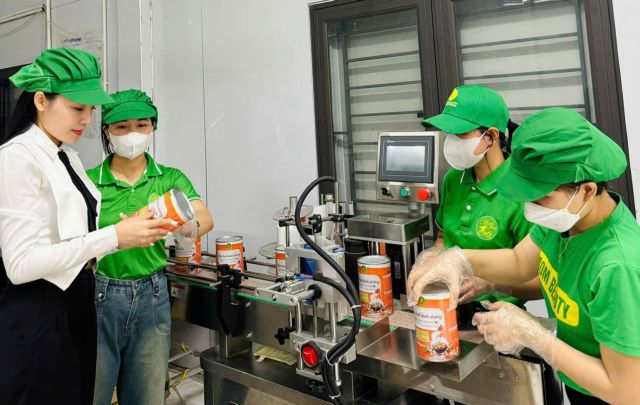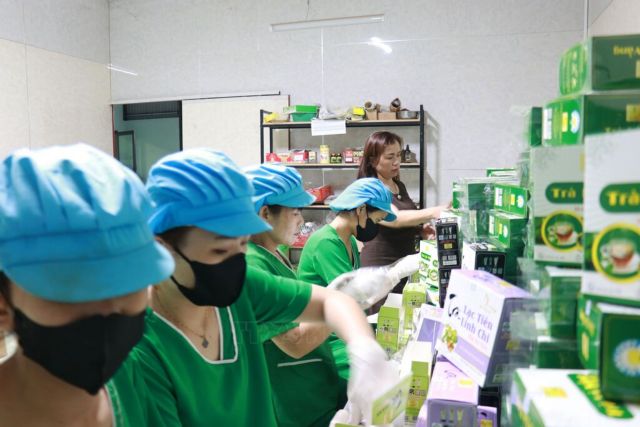 Economy
Economy


|
| Women-led businesses have played an increasingly significant role in agriculture, consumer goods, services and innovation. — Photo vneconomy.vn |
HÀ NỘI — Emerging trends in gender equality in business and the growing adoption of gender responsive procurement (GRP) took centre stage at a conference held in Hà Nội on Tuesday, highlighting new opportunities for women entrepreneurs.
The conference showcased how GRP can enhance business competitiveness and expand market access for women-led enterprises and gender-responsive enterprises (GREs), underscoring its increasing significance in the Vietnamese business landscape.
It also addressed sustainable development trends linked to Environmental, Social and Governance and Sustainable Development Goals, transparency and inclusion in supply chains, connecting partners and expanding cooperation and market opportunities for women-led businesses.
More than 100 delegates, including representatives from ministries, sectors, international organisations, business associations and women entrepreneurs’ networks, affirmed their commitment to supporting the implementation of the Women’s Empowerment Principles (WEPs). The initiative, jointly launched by UN Women and the UN Global Compact, encourages businesses to adopt policies and practices that advance gender equality in the workplace and supply chains.
Vice President of the Việt Nam Women Entrepreneurs Council under the Vietnam Chamber of Commerce and Industry Mai Thị Diệu Huyền noted that after nearly four decades of economic reform, the private sector had become a key driver of national growth, contributing 45 per cent of GDP, 33 per cent of State budget revenues and accounting for 97 per cent of all enterprises nationwide.
Within this sector, women-owned businesses represent 24 per cent, playing an increasingly significant role in agriculture, consumer goods, services and innovation, according to Huyền.
Despite this progress, most women-owned enterprises continue to face obstacles related to scale, access to capital, market linkages and opportunities to join high-value supply chains.
Against this backdrop, the UN Women-implemented project on enhancing women's economic capacity in Asia-Pacific through promoting GRP is creating new opportunities for women-led enterprises to strengthen competitiveness and integrate more deeply into sustainable value chains.
Huyền also announced the launch of the We Rise Together project for the 2025-29 period. The project will be implemented by UN Women in collaboration with domestic partners and will prioritise expanding market opportunities for women-owned businesses in the consumer and tourism sectors, as well as in green and environmentally friendly business models.

|
| A woman-led enterprise in Quảng Trị Province. — VNA/VNS Photo |
Participants at the event agreed that, at the current stage of development, businesses, particularly women-owned enterprises, would require a transparent and inclusive ecosystem that enables women to participate equally in economic activities.
They emphasised that advancing the Women’s Empowerment Principles (WEPs) and gender responsive procurement (GRP) would be a strategic approach to building diverse, sustainable supply chains, strengthening market resilience, fostering innovation and expanding opportunities for women to access, participate in and equitably benefit from economic growth.
Caroline T Nyamayemombe, UN Women Country Representative in Việt Nam, said that when State agencies, the private sector and development partners work together, they would not only advance gender equality but also generate new momentum for broader economic and social development.
She affirmed that UN Women stood ready to continue supporting efforts to create more success stories among gender-responsive businesses in Việt Nam.
The WEPs consist of seven core principles: high-level corporate leadership; fair treatment of women and men at work without discrimination; employee health, well-being and safety; education and training for career advancement; enterprise development, supply chain and marketing practices; community initiatives and advocacy; and measurement and reporting.
As of November 16, a total of 11,655 businesses and organisations across more than 160 countries have committed to implementing the WEPs. In Việt Nam, participation has risen from 67 businesses in 2020 to around 239 by November 2025, reflecting the growing adoption of the principles within the local business community. — VNS




